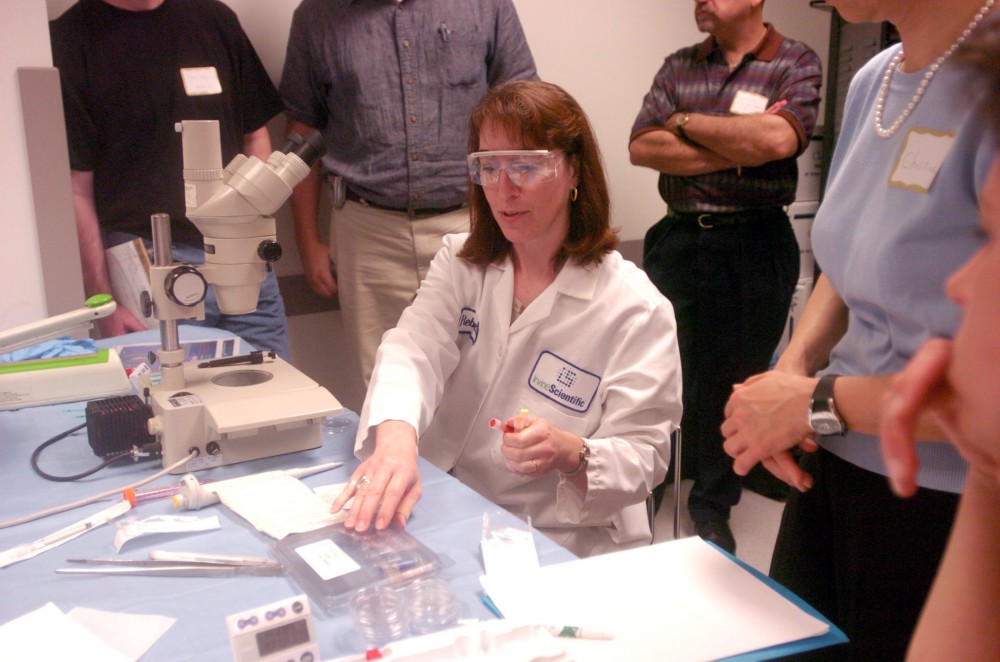By Lynne Terry
The Oregonian, Portland, Ore.
A “Sex and the City” type of cocktail party is coming to Portland, geared towards young women worried about their ticking biological clocks.
Two women from Los Angeles are staging an event Thursday to promote egg freezing, a medical technique designed to keep a woman’s pregnancy dreams alive as the years flip by. The eggs are taken from her body and flash-frozen, keeping them viable for years.
Reproductive specialists have frozen the eggs of women facing chemotherapy or radiation for decades. But in 2012, the American Society for Reproductive Medicine essentially endorsed the practice as an elective procedure by declaring that egg freezing was no longer considered experimental.
Since then, the egg-freezing business has ramped up at fertility centers across the country.
“It certainly has taken off,” said Dr. Richard Paulson, vice president of the American Society for Reproductive Medicine. “Egg freezing really works now.”
Physicians used to preserve women’s eggs, or oocytes, using a slow freeze method. But that caused ice crystals to form, which damaged the cells when they were thawed. In the past decade, a new method was developed to avoid that problem. Vitrification involves sinking the eggs in liquid nitrogen, instantly freezing them at minus 321 degrees Fahrenheit. The eggs are tucked away in this state of suspended animation for future use.
The procedure is not cheap, costing about $10,000 a pop, plus hundreds of dollars a year in storage fees. It’s not covered by most insurance policies.
But that hasn’t deterred young women interested in postponing childbirth while they climb the corporate ladder or those with money and no partner who want to have their own genetic child in the future.
“Women now have an option of preserving and of essentially being their own egg donor in the future,” Paulson said.
Physicians at Oregon Health & Science University performed several dozen elective egg-freezing procedures last year, up from less than a dozen the year before, according to Dr. Diana Wu, an OHSU reproductive specialist.
Wu said all of the women were unmarried. About a quarter had steady partners.
“All of them were unsure about when to initiate child bearing, but wanted to take steps to preserve their current fertility potential,” Wu said.
Unlike men, who produce sperm throughout life, women are born with all the eggs they will ever have. At puberty, most women have about 400,000 immature eggs, or oocytes, which are released in batches during menstruation. With age, fewer eggs are released in each cycle and their quality diminishes.
By 37, a woman’s fertility starts to decline dramatically. At 45, it essentially hits zero.
At OHSU, the average age of women who have opted for elective egg freezing has been 36, Wu said.
The procedure has few risks, experts say. In preparation, the patient usually takes oral contraceptives to block the body’s natural hormones then gives herself daily hormone shots for about 12 days. The injections stimulate the ovaries and cause more eggs to ripen. When they’re mature, the eggs are harvested. The woman is sedated but not put under — similar to what’s done for a colonoscopy — while a physician uses a needle to aspirate the eggs.
They’re flash-frozen on-site and stored.
When the time comes, they’re thawed, injected with sperm to create an embryo, which is implanted in the woman’s womb. But there’s no guarantee of a baby.
The American Society for Reproductive Medicine estimates that each thawed egg has a 5 to 12 percent chance of pregnancy. But those odds are better than what women face in middle age, Paulson said.
“You will have a better chance of becoming pregnant with the eggs you froze when you were 30 than trying to get pregnant with your own at 40,” Paulson said.
There is no age limit to when an embryo from the eggs can be implanted. Though eggs age, a woman’s uterus remains vital later in life, Paulson said. But there is a lack of information about the long-term health of children born from frozen eggs.
Both of the women promoting the egg-freezing event — “On Ice” — have experience with the procedure. Wendie Wilson-Miller, a communications specialist and egg scout for infertile women, froze 22 eggs when she was single and 30. Now 40, married and with two children conceived naturally, she has donated eggs to a cancer patient who now has a little girl. Her business partner, Shalene Petricek, a trainer in the biotech industry, is 44 and has 10 eggs stored away for the future.
Last November, they created Great Possibilities Egg Freezing, one of a growing number of third-party agencies that act as liaisons with reproductive specialists.
“We hold their hand through the process,” Petricek said.
Great Possibilities hosted its first “On Ice” event in April in Los Angeles. The cocktail party on Thursday — from 7 to 9 p.m. at Hotel deLuxe — is its second.
Free appetizers and drinks will be followed by a panel discussion, which will include Dr. John Hesla from Oregon Reproductive Medicine. The private clinic and OHSU are the main egg-freezing sites in Portland.
Wilson-Miller said her agency has negotiated discounts with the clinic and a pharmaceutical company in Los Angeles to save women money.
“What Great Possibilities can promise is that they will pay less going through us than through the clinics directly,” Wilson-Miller said.
But trying to lure clients for a medical procedure by offering free cocktails and snacks strikes some physicians as odd.
“It’s a little strange to be doing that kind of marketing,” Paulson said. “It’s a legitimate medical treatment. What can you say?”
Paulson and Wu agreed these parties are good for driving home the reality that as women age, so do their eggs and with that they lose their chance of conceiving naturally.














































































































































































































































































































































































